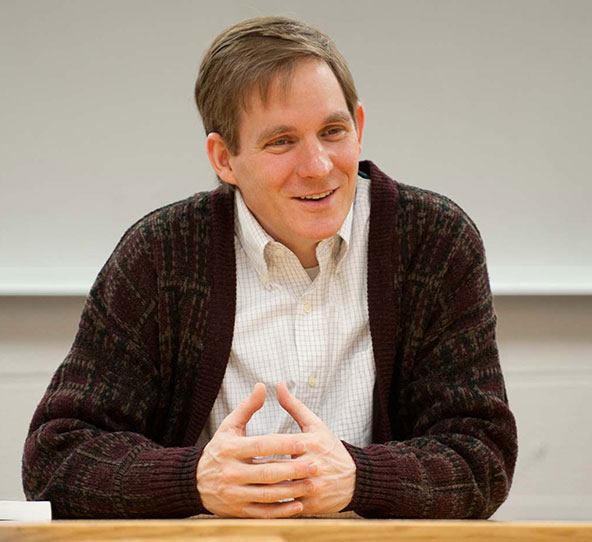Message from the Director
Randall W. Stone

The peace of Europe was shattered on February 24, 2022, when Vladimir Putin’s Russia launched a massive invasion of Ukraine by land, air and sea. Putin must have been astounded, as indeed the rest of the world has been, by the selfless tenacity of the Ukrainian defense that has unfolded in the weeks that followed. He was doubtless surprised by the ineffectiveness and unprofessionalism of his own forces, which fell back on several fronts after failing to achieve their objectives and suffered horrendous casualties, leaving behind billions of dollars of wrecked equipment. He was confounded by the remarkable unity of the United States and its allies in confronting his aggression. Russian experts had predicted that Europe would be disunited and ineffectual in the wake of Brexit and America would be immobilized by partisan polarization. He appears to have been caught unprepared for the severe economic sanctions that have crippled his economy, and he was apparently surprised by the strong opposition to the war within Russia, which led to widespread protests and thousands of arrests.
The Russian invasion has already led to vast destruction, millions of refugees, horrific war crimes and global economic dislocations, including acute food shortages in Africa. Unfortunately, it does not seem likely to end soon. Putin’s initial campaign, which appeared to be intended to conquer Ukraine and depose its government, was turned back at Kyiv, Kharkhiv, Severodonetsk and Mikolaiv. Russian forces have subsequently withdrawn from some of their most exposed positions and concentrated on expanding the territory that they have seized in the southeastern part of the country, but their second offensive has again run out of steam. Russia appears to have deployed most of its combat-capable forces to Ukraine, where they have been worn down steadily. Ukraine, on the other hand, has been able to steadily build up its army and equip it with modern Western weapons, so that it has increased its capabilities. Ukraine’s president, Volodymyr Zelensky, thinks that he is winning and is not inclined to stop fighting as long as Russia holds territory that it seized this year. On the other hand, Putin has painted himself into a rhetorical corner where it will be politically humiliating—and personally dangerous—to accept anything less than a decisive victory. The war will likely continue.
Early in the conflict it appeared likely that Putin might escalate his conflict with the West rather than let his army face defeat, but there does not appear to be a path of escalation now that would offer him an advantage. At the beginning of the war analysts expected Russia’s advantage in air power to prove decisive—in fact, a visiting Ukrainian general old me a few years ago that it was unlikely that Ukraine could defend itself for long against a Russian invasion because Russia would have undisputed control of the air. In that scenario, Russia would be able to demolish Ukrainian defenses while taking light losses. Facing the prospect of Ukraine’s imminent defeat, NATO countries might have contemplated intervening in the air battle, perhaps by creating a no-fly zone over Ukraine, which in turn would have made the Russian position on the ground untenable. In that case, Putin might have resorted to nuclear attacks against NATO airbases. The opportunity for this scenario to unfold seems to have passed, however, because Russia never achieved command of the air. As long as Russia is fighting Ukrainians, rather than NATO forces, its nuclear weapons do not provide it with any credible options.
Future historians will likely look back on 2022 and wonder whether a chance was missed to avert a new cold war with Russia. When I started teaching the history of the Cold War thirty years ago I passed out lists of dates to my class and highlighted some of them: the Soviet actions on the lists I passed to the right, and the American actions on the lists I passed to the left. Highlighting different dates on identical lists was sufficient to provoke a vigorous debate about the causes of the Cold War. Some Russians will no doubt believe that Americans provoked the current conflict by expanding NATO in previous decades, by arming Ukraine after Russia’s first invasion in 2014, by refusing to guarantee that Ukraine could never join NATO, by conducting joint military exercises last year. Ukraine was never likely to join NATO until Putin decided to invade, however, and it appears increasingly unlikely that Russian security concerns were ever Putin’s primary reason for doing so.
Putin is an insecure autocrat who fears what every autocrat fears: that the people will become frustrated enough with him to organize collectively and turn him out. Putin has long blamed the United States for every evidence of dissatisfaction with autocratic rule in the countries of the former Soviet Union. US-Russian relations took a downturn in 2011 when Russians staged their first large-scale protests against Putin’s regime, and they became deeply strained after Ukraine threw off its pro-Russian leader, Viktor Yanukovych, in 2014. The last year saw protests over election fraud that threatened to topple the pro-Russian leaders of Belarus and Kazakhstan until Putin intervened. Dissatisfaction with Putin’s kleptocratic regime has been rising in Russia, and Ukraine served as evidence that democracy was possible—evidence that Putin likely would have tried to crush, NATO expansion or no NATO expansion. Putin’s pseudo-religious justifications for reuniting the historically Russian lands and his rhetorical claims that Ukraine’s leaders are Nazis are probably no more sincere than his protests about Russian security. He is a former KGB agent, for whom truth is instrumental and power is the ultima ratio. Unfortunately, we are likely to face a lengthy conflict with him, unless his fears turn out to be well grounded.
Randall W. Stone is Professor of Political Science, Chair of the Political Science Department, and Director of the Skalny Center for Polish and Central European Studies.
